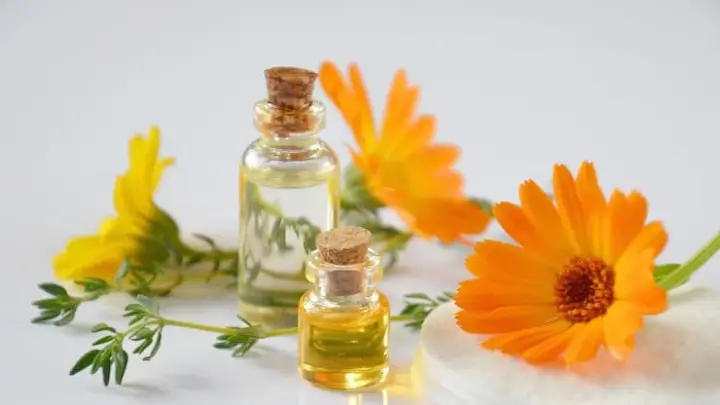Did you know essential oils can help treat hyperpigmentation and lighten your overall complexion?
That’s right. If you have hyperpigmentation, you might have recently searched for a way to improve the appearance of your skin.
Hyperpigmentation is a common skin concern caused by an overproduction of melanin, the pigment that gives our skin its color.
Hyperpigmentation can appear as age spots, freckles, or other dark areas on the skin — and it can be frustrating to treat. While essential oils cannot cure hyperpigmentation, they can help reduce its appearance.
Before we look at the best essential oils for hyperpigmentation, let’s find out what this skin condition is all about and what causes it.
What Is Hyperpigmentation?
Hyperpigmentation results from too much melanin in the skin, which leads to darker patches and discoloration. It can be caused by genetics, hormones, sun damage, acne, or even trauma to the skin.
Hyperpigmentation is usually harmless but can cause some people to feel self-conscious about their appearance. There are a variety of products designed to treat it— including over-the-counter products and prescription medications like hydroquinone.
However, if you’re wary of chemical treatments for your hyperpigmentation, there are several natural remedies such as essential oils that may help lighten dark spots on your skin.
Essential Oils for Hyperpigmentation
1. Lavender Oil
Lavender oil is well-known for its calming effects, but it’s also an effective treatment for hyperpigmentation. It stimulates new cell growth and helps fade dark spots by inhibiting tyrosinase, an enzyme that stimulates melanin production.
2. Rosehip Oil
Rosehip oil is a well-known moisturizer and anti-aging treatment — but it also works to fade hyperpigmentation. According to a 2017 study published by the US National Library of Medicine, rosehip seed oil contains ursolic acid, a compound known to inhibit melanin production.
SEE: How to Use Rosehip Oil on Face: Discover Incredible Ways to Use Your Oil
3. Carrot Seed Oil
Carrot seed oil is a great essential oil for hyperpigmentation because it contains carotene and vitamin A. These components help lighten dark spots quickly and naturally without irritating your skin. So if you have sensitive skin, carrot seed oil is a great option for you.
4. Lemon Oil
Lemon essential oil is one of the best oils for curing hyperpigmentation because it helps to reduce dark spots by removing dead skin cells. This essential oil also lightens your skin tone and gives you glowing and fairer skin.
Topical application can cause photosensitivity; however, mixing it with a carrier oil before applying it to your skin.
5. Sandalwood Oil
Sandalwood essential oil is obtained from the sandalwood tree (an evergreen tree that grows in India). It has numerous health benefits, including treating acne and hyperpigmentation, as well as reducing inflammation, and promoting wound healing.
6. Chamomile Oil
Chamomile oil is another great essential oil for treating hyperpigmentation. It comes from chamomile flowers and people have used it for ages to treat several skin problems. It also helps in lightening overall skin complexion and can help prevent further darkening.
7. Tea Tree Oil
Tea tree oil has antiseptic and antifungal properties which make it effective in the treatment of hyperpigmentation. You can either mix it with your face wash or apply it directly to affected areas before bedtime.
SEE: Do You Have Skin Tone? See All the Information You Need Here
8. Frankincense Oil
Frankincense oil can help stimulate new cell growth, which may assist with reducing the appearance of scars and hyperpigmentation. This essential oil also has anti-inflammatory properties that can help soothe skin irritation and treat acne.
Apply diluted frankincense oil directly to problem areas or add a few drops to your moisturizer or body lotion for an overall glow.
9. Helichrysum Essential Oil
Another great essential oil for treating age spots and other types of hyperpigmentation is helichrysum oil. This oil also acts as a natural toner to make your skin look brighter and firmer.
It contains exfoliating properties that help in regenerating new cells by removing dead cells from your body, thereby reducing discoloration.
10. Patchouli Oil
Patchouli oil is a natural exfoliator and antiseptic that can help lighten the skin while killing bacteria on the surface of your skin. This may help reduce the appearance of acne as well as acne scars.
11. Geranium Oil
People have used geranium essential oil for centuries to balance hormones and restore health to the skin. According to research, its astringent and antiseptic properties can also help reduce hyperpigmentation, treat acne scars, and reverse sun damage.
12. Cinnamon Oil
Cinnamon oil is a potent antioxidant that helps to protect the skin against UV rays (a major cause of hyperpigmentation). The continued use of this essential oil will also help prevent future dark spots and acne scars.
13. Tangerine Oil
Using tangerine oil is a natural, safe, and effective way of treating hyperpigmentation. Tangerine oil is rich in minerals, and other nutrients that can help fight hyperpigmentation and other skin conditions.
It also contains antioxidants, which are important because they protect your skin from elements that cause uneven skin tone.
SEE: Here Are Some Unique Ways to Effectively Use Essential Oils
14. Pomegranate Oil
Pomegranate oil is extracted from the seeds of the pomegranate fruit, which is a rich source of antioxidants. Antioxidants can help protect your skin against the sun’s ultraviolet (UV) rays, which may, in turn, help prevent dark spots and wrinkles.
15. Rose Otto Oil
Rose Otto oil is widely known for its healing effect that works towards reducing hyperpigmentation. It possesses a rich floral scent that can balance hormones and reduce stress levels, both of which are known causes for hyperpigmentation.
Rose Otto also has strong anti-inflammatory properties which provide relief from redness, itching, and breakouts on the skin.
Side Effects of Using Essential Oils for Hyperpigmentation
Essential oils can cause allergic reactions in some people; the symptoms include itching, redness, or nodules on the skin. To prevent this type of side effect, experts recommend performing a patch test before using any essential oil.
You can do it by applying a small amount of the product on your forearm or inside your wrist and waiting for 24 hours to see if any irritation occurs. You should still proceed with caution even if you don’t notice any problems with the patch test.
Another common side effect of essential oils is that they can make your skin more sensitive to UV rays. This means that when you apply them topically, they can cause serious burns if exposed to sunlight or ultraviolet radiation from artificial sources.
This phototoxic action depends on the individual essential oil; some oils are more phototoxic than others, so always apply sunscreen when using such oils.
SEE: Hyperpigmentation, The Skin Menace: Causes, Types, and Treatment
How to Use Essential Oils for Hyperpigmentation
The best way to use essential oils for hyperpigmentation is to apply them directly to the affected area of the skin.
However, it is important to always dilute essential oils before applying them to your skin. This is because they are highly concentrated and may cause irritation if you use them in high concentrations.
To make a 1% dilution of essential oil, add 6 drops of essential oil to 4 tablespoons (around 50 ml) of base oil. For a 2% dilution, add 12 drops of essential oil to 4 tablespoons (around 50 ml) of base oil.
A good base oil to use is sweet almond oil or coconut oil, which you can get from most pharmacies or health food shops.
You can also mix different types of essential oils together to create a unique blend that works well for your skin. However, make sure to do some research about each oil so you know what effect it has and how much to use.
FAQs
Where can you get essential oils?
You can find essential oils at many big-box retailers, health food stores, or specialty shops. If you are looking for specific scents or blends, it’s best to purchase them online from independent sellers.
Does coconut oil help with hyperpigmentation?
Yes, it does. Coconut oil can help reduce hyperpigmentation by improving the health of your skin cells and encouraging them to regenerate quickly. It also contains antioxidants that protect against harmful environmental factors, including UV radiation and pollution.
Can tea tree oil treat acne?
Yes, it can. Applying 100 percent tea tree oil to your skin can help treat acne and fade acne scars. However, it’s important to note that tea tree oil alone won’t get rid of acne for most people. You’ll need to combine it with other treatments and lifestyle changes for the best results.
Conclusion
There you have it: fifteen essential oils that are natural, easy to use, and powerful enough to reduce hyperpigmentation over time.
As you can see, many of these essential oils for hyperpigmentation contain carotenoids, vitamins, and other antioxidants. Such compounds work by fighting free radicals in the body and helping to reduce melanin production in the skin.
But they’re not the only thing working in your favor here. Since most of these oils contain anti-inflammatory and antiseptic properties, they can help also with any underlying skin condition.
Thanks for reading.
Visit Africana Fashion to learn more about the benefits of essential oils for hyperpigmentation, and other skin issues.







